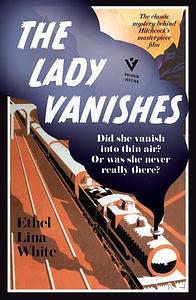You need to sign in or sign up before continuing.
Take a photo of a barcode or cover
Whenever I read a book that Hitchcock adapted into a film, I am always amazed how he keeps the book's central theme and yet elevates it into something that's all his own. This book is no different. All my favorite parts are showcased in the film. The portions of the book I didn't like were omitted from the film. The concept is a sold one and still works even without the war and spy backdrop that Hitchcock added.
dark
mysterious
tense
medium-paced
Plot or Character Driven:
A mix
Strong character development:
No
Loveable characters:
Complicated
Diverse cast of characters:
No
Flaws of characters a main focus:
No
One of the few times where the film (by Hitchcock) is better than the book.
mysterious
tense
fast-paced
Plot or Character Driven:
Plot
Strong character development:
No
Loveable characters:
No
Diverse cast of characters:
No
Flaws of characters a main focus:
No
Having liked Hitchcock’s ‘The Lady Vanishes’, I was pleased to see the story that inspired the film being brought back by the British Library.
It turned out to be a suspenseful read, eventually. The narrative starts slow and sets not so much the scene, although the descriptions were beautiful, but rather many of the players and their motivations. Our heroine comes across at first in a less than flattering lens, but be patient. Once in the train, all starts happening.
Yes, I did like it, for two reasons. First, the thriller aspect of it. I was getting really anxious for Iris (and Miss Froy), not being believed, being gaslighted, and even threatened! The 3rd person narration does wander about, maybe too much, but it still mostly worked for me (liked the denouement but not the very end
Then for the themes the author focuses on. The most visible one is that of communication and language, how people react in foreign lands at not being understood, how some try to learn the new language while others become obtuse. This lead on to the behaviour of the English in the 1930s, a very nationalistic one and rather unsavoury. Again, we see how even this nationalism is undermined by personal needs, even petty ones. Finally, we have a study on the worth of witnesses. Iris, our heroine, is at first listened to just because she is English. However, since being a woman and alone, her voice is progressively diminished when put against that of people of supposedly higher social status and men.
Coming back to Hitchcock’s adaptation, he did use nearly all the elements but he changed the tone. He also took away from the heroine, diluting her role by having the male character joining the limelight. Still, the result is more comedic to me, while he could have made it really tense.
It turned out to be a suspenseful read, eventually. The narrative starts slow and sets not so much the scene, although the descriptions were beautiful, but rather many of the players and their motivations. Our heroine comes across at first in a less than flattering lens, but be patient. Once in the train, all starts happening.
Yes, I did like it, for two reasons. First, the thriller aspect of it. I was getting really anxious for Iris (and Miss Froy), not being believed, being gaslighted, and even threatened! The 3rd person narration does wander about, maybe too much, but it still mostly worked for me (liked the denouement but not the very end
Spoiler
why would she end up with Max after what he did?!Then for the themes the author focuses on. The most visible one is that of communication and language, how people react in foreign lands at not being understood, how some try to learn the new language while others become obtuse. This lead on to the behaviour of the English in the 1930s, a very nationalistic one and rather unsavoury. Again, we see how even this nationalism is undermined by personal needs, even petty ones. Finally, we have a study on the worth of witnesses. Iris, our heroine, is at first listened to just because she is English. However, since being a woman and alone, her voice is progressively diminished when put against that of people of supposedly higher social status and men.
Coming back to Hitchcock’s adaptation, he did use nearly all the elements but he changed the tone. He also took away from the heroine, diluting her role by having the male character joining the limelight. Still, the result is more comedic to me, while he could have made it really tense.
slow-paced
Plot or Character Driven:
Plot
Strong character development:
Complicated
Loveable characters:
No
Diverse cast of characters:
Yes
Flaws of characters a main focus:
Complicated
This is by far the best one I've read by Ethel Lina White.
Really good, with some good characters.
Really good, with some good characters.
adventurous
tense
slow-paced
Plot or Character Driven:
A mix
Strong character development:
No
Loveable characters:
No
Diverse cast of characters:
No
Flaws of characters a main focus:
Yes
A delightful little read. I can easily see why this book attracted Hitchcock’s attention. It’s as Hitchcockian a book as you can get! It brings to mind the plight of Cary Grant in “North by Northwest” also. The book doesn’t let the tension ease right till the very end. What’s true and what’s not? As a reader, you’re as confused as Iris and as frustrated and fearful. The book has plenty of humour as well, another ingredient ready made for Hitchcock. A fun read!
I haven’t seen the movie “The Last Vanishes” so the mystery was unspoiled going on. However the means of Miss Froy vanishing is obvious as soon as it happens.
It seems a cliché. But clichés come from somewhere and I think it’s from here.
Earle Stanley Gardner used a very similar device in one of his Perry Mason mysteries written after this book. Christie and others have similar trickery. I’ll credit White with originating it in absence of any research on my part.
The reason for the disappearance is only vaguely understood in the end (by me anyway).
White does a good job of teasing possible safe outcomes and then pulling them back. The suspense is not exactly unrelenting but strong enough that it kept me reading.
Interestingly, iris briefly mentions a story she heard about a missing woman, and Hitchcock used that story in an episode of Alfred Hitchcock Presents.
3.6 rounded up
It seems a cliché. But clichés come from somewhere and I think it’s from here.
Earle Stanley Gardner used a very similar device in one of his Perry Mason mysteries written after this book. Christie and others have similar trickery. I’ll credit White with originating it in absence of any research on my part.
The reason for the disappearance is only vaguely understood in the end (by me anyway).
White does a good job of teasing possible safe outcomes and then pulling them back. The suspense is not exactly unrelenting but strong enough that it kept me reading.
Interestingly, iris briefly mentions a story she heard about a missing woman, and Hitchcock used that story in an episode of Alfred Hitchcock Presents.
3.6 rounded up
adventurous
medium-paced
Plot or Character Driven:
Plot
Strong character development:
Complicated
Loveable characters:
Complicated
Diverse cast of characters:
No
Flaws of characters a main focus:
Yes





